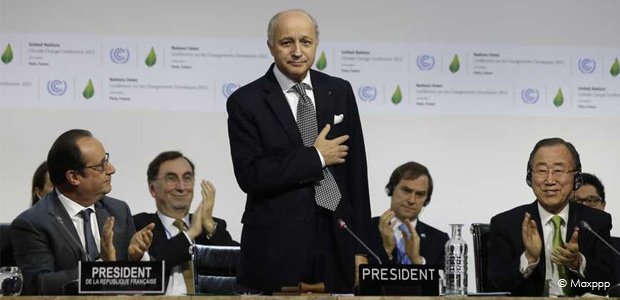Paris Climate Deal a Success: Now the Real Work Begins

The world is celebrating the international climate change conference in Paris as a success. However, it remains uncertain whether the agreement will actually make history by curbing climate change. It all depends on whether countries actively implement their ambitious climate targets, and it won’t be possible without a real transition to clean energy.
Key points of the deal
Goal in sight
As part of the new deal, 195 countries agree to limit global warming to well below 2 degrees Celsius above the pre-industrial era by the end of the century, with efforts to keep it at 1.5 degrees.
By the end of the century, parties should find a balance between greenhouse gas emissions and their removal from the atmosphere. This means that they should strive for net greenhouse emissions of zero in the second half of this century. They will only be able to emit the amount of greenhouse gases that can be removed from the atmosphere, for example, by vegetation.
Ironing out the details
Some countries have already submitted individual environmental protection plans, but the plans have not been adequate to maintain a less than 2 degree increase in global temperatures. These countries are thus expected to update their targets every five years. In 2020, the first new targets will be set for 2030. Countries that have already submitted plans through 2030 will improve them where possible.
Assistance for developing nations
The deal includes financial and technical support for developing nations. Between 2020 and 2025, industrial nations agreed to set aside $100 billion (some €91 billion) a year for developing nations. After that, a new, larger amount will be agreed upon. Other newly industrialized countries, such as China and the oil-producing countries in particular, are encouraged to voluntarily contribute funds.
Quotes from the web
Thomas L. Friedman, Op-Ed Columnist at The New York Times writes “I had low expectations for the U.N. climate meeting here and it met all of them — beautifully. I say that without cynicism.”
John D. Sutter, CNN writes about the climate accord: “It’s a bold signal to boardrooms and national capitals around the world: The era of fossil fuels is over, and we’re moving toward cleaner (and safer and healthier) sources of energy fast.”
Paul Krugmann, American economist and Nobel Prize-winning Op-Ed columnist at The New York Times about the context why COP21 came to success: “The answer, I’d suggest, is that new technology has fundamentally changed the rules.(…) The reality, however, is that costs of solar and wind power have fallen dramatically, to the point where they are close to competitive with fossil fuels even without special incentives – and progress on energy storage has made their prospects even better. Renewable energy has also become a big employer, much bigger these days than the coal industry.”
Conclusion
With all the confidence and celebration surrounding last weekend’s outcome, the parties involved must not forget their commitment; their dedication to the transition away from fossil fuels and toward clean energy carriers is essential. We, as individuals, should also think about how we can contribute to climate protection. This mashable link provides some helpful tips.
Image: President Laurent Fabius presents the final version of the contract to the 195 countries (c) Maxppp via France Bleu

Feel free to contribute!